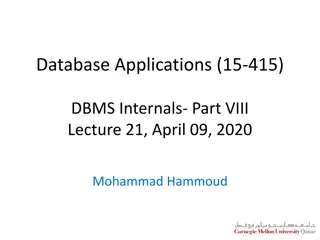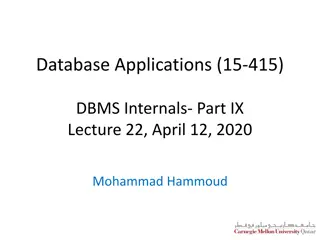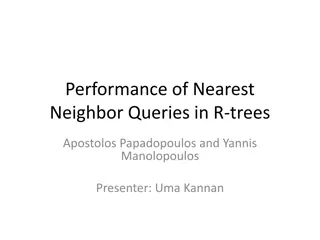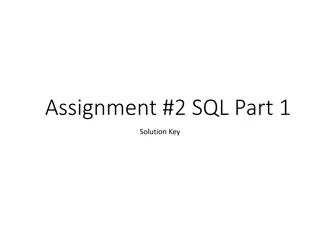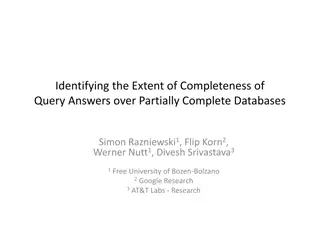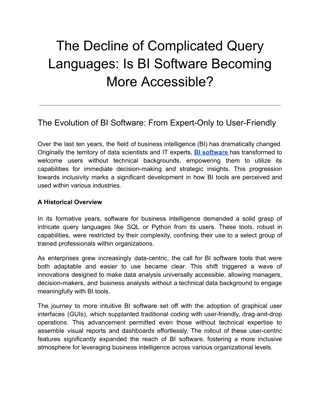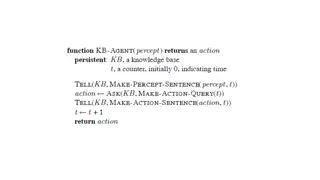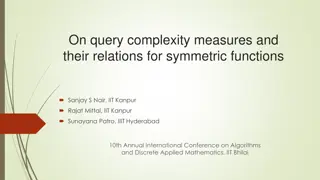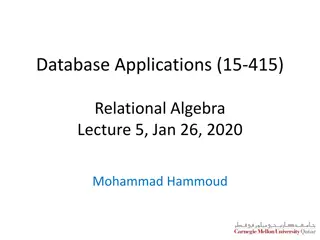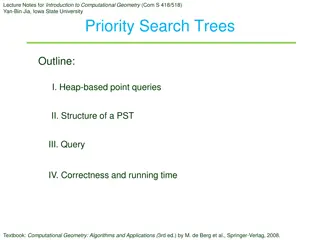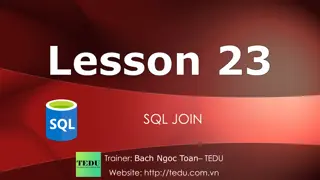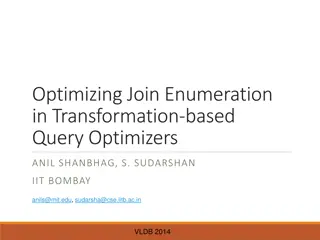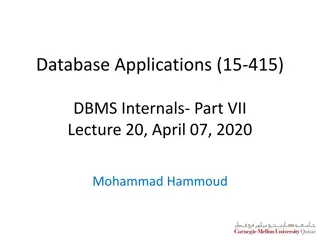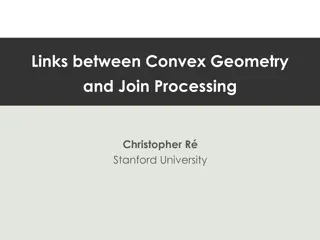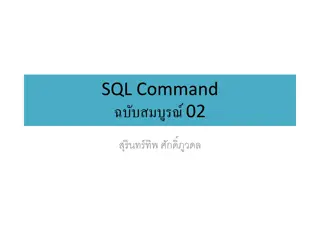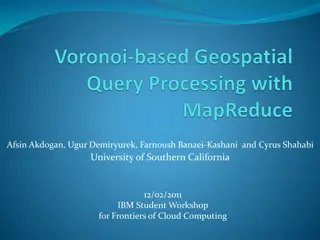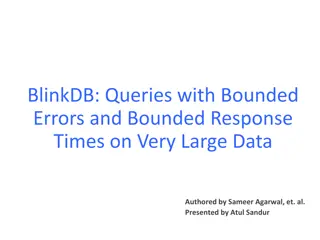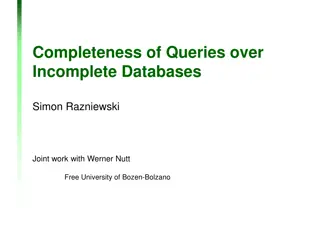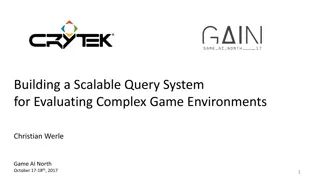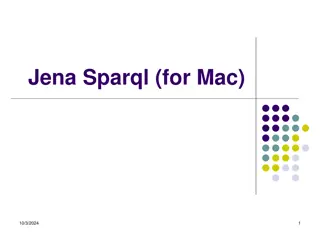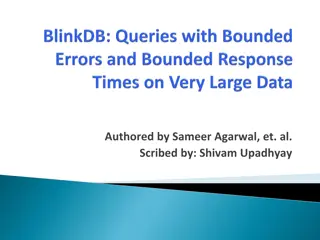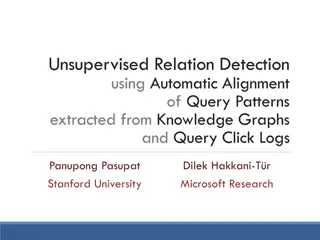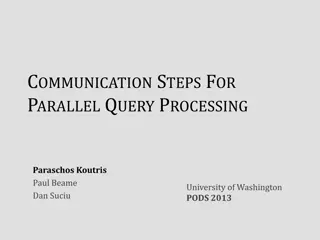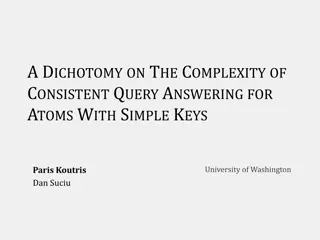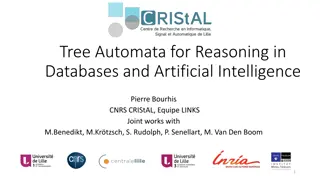Enhancing Query Optimization in Production: A Microsoft Journey
Explore Microsoft's innovative approach to query optimization in production environments, addressing challenges with general-purpose optimization and introducing specialized cloud-based optimizers. Learn about the implementation details, experiments conducted, and the solution proposed. Discover how
2 views • 27 slides
Rich snipptes
User intent, also known as search intent or query intent, refers to the underlying goal or purpose behind a user's search query when they use a search engine. It represents what the user is looking to accomplish or find when they enter a specific keyword or phrase into a search engine.
1 views • 8 slides
Advance Power Query
Dive into the world of Advance Power Query with this comprehensive guide on how to optimize your data analysis process. Explore powerful techniques and features through visually engaging slides to enhance your skills in data manipulation and transformation.
0 views • 7 slides
Database System Concurrency Control and Transactions Overview
Studying relational models, SQL, database system architecture, operator implementations, data layouts, and query optimization laid the foundation for advanced topics like Concurrency Control and Recovery. Discover how transactions group related actions, ACID properties ensure data integrity, and the
0 views • 57 slides
Understanding Hash Join Algorithm in Database Management Systems
In this lecture, Mohammad Hammoud explores the Hash Join algorithm, a fundamental concept in DBMS query optimization. The algorithm involves partitioning and probing phases, utilizing hash functions to efficiently join relations based on a common attribute. By understanding the intricacies of Hash J
1 views • 41 slides
Understanding Different Types of SQL Joins
Explore the various types of SQL joins such as INNER JOIN, LEFT (OUTER) JOIN, RIGHT (OUTER) JOIN, and FULL (OUTER) JOIN. Learn how each type functions and the syntax for implementing them. Get insights into examples of INNER JOIN and LEFT OUTER JOIN operations to enhance your SQL knowledge.
0 views • 26 slides
Efficient Budget Query Process in Self-Service Banner 9.0
Accessing and navigating the Self-Service Banner 9.0 for budget queries can be simplified by following a step-by-step guide. From initiating a new finance query to selecting relevant columns and submitting the query, this process ensures accuracy and efficiency in tracking budget status by account.
0 views • 19 slides
Query Optimization in Database Management Systems
This content covers the fundamentals of query optimization in Database Management Systems (DBMS), including steps involved, required information for evaluating queries, cost-based query sub-system, and the role of various components like query parser, optimizer, plan generator, and cost estimator. I
0 views • 51 slides
Understanding Active Learning in Machine Learning
Active Learning (AL) is a subset of machine learning where a learning algorithm interacts with a user to label data for desired outputs. It aims to minimize the labeling bottleneck by achieving high accuracy with minimal labeled instances, thus reducing the cost of obtaining labeled data. Techniques
0 views • 17 slides
Performance of Nearest Neighbor Queries in R-trees
Spatial data management research focuses on designing robust spatial data structures, inventing new models, constructing query languages, and optimizing query processing. This study explores the estimation of query performance and selectivity, specifically in R-trees, for efficient access planning.
1 views • 32 slides
Understanding Joins in DBMS: INNER JOIN, LEFT JOIN, and Examples
Join statements in DBMS, such as INNER JOIN and LEFT JOIN, are used to combine data from multiple tables based on a common field. INNER JOIN selects rows that satisfy a condition from both tables, while LEFT JOIN returns all rows from the left table and matching rows from the right table. Examples i
3 views • 19 slides
SQL Query Solutions for Film Database
In this SQL solution key, various queries have been provided for a film database. It covers selecting titles and lengths of films rated PG and longer than 180 minutes, finding the average rental rate for each movie rating, counting PG movies mentioning "documentary" in their description, identifying
2 views • 13 slides
Streamlining Student Admission Process with Data Upload and Query Viewer
Simplify the student admission process by allowing users to upload personal and academic data using a Student Data Template. Learn how to extract student information and verify uploads through a detailed flow chart. Enhance efficiency with the Query Viewer feature for accessing and searching student
0 views • 61 slides
Shifting Bloom Filters at Peking University, China
Explore the innovative research on Shifting Bloom Filters conducted at Peking University, China, featuring evaluations, conclusions, background information, and insights on membership, association, and multiplicity queries. The study delves into hash functions, theoretical results, and the Shifting
1 views • 25 slides
Identifying Completeness of Query Answers in Incomplete Databases
The study delves into how to assess the completeness of query answers when dealing with partially complete databases. By analyzing data from a telecommunication company’s data warehouse, the query results are examined to determine if all warnings generated by maintenance objects with hardware team
0 views • 23 slides
The Decline of Complicated Query Languages_ Is BI Software Becoming More Accessible_
Discover the shift towards simpler, more accessible BI software tools as we explore the decline of complicated query languages in the business intelligence landscape. This blog post discusses the impact of user-friendly interfaces on organizational d
0 views • 9 slides
Understanding Forward Chaining in Propositional Logic
Forward chaining in propositional logic is a recursive, stack-based version of back-chaining that can be modified to handle variables using unification and negation context. By applying a set of rules and facts, the process aims to prove a given query by iteratively inferring new information. Illust
0 views • 11 slides
Understanding Cosine Similarity in Inverted Index for Querying
In this document, Dr. Claudia Pearce explains how to build and query from an inverted index, focusing on calculating the Cosine Similarity. The process involves calculating the dot product of terms in the document and query, updating sums based on term weights, and understanding the significance of
0 views • 15 slides
Quantum Query Complexity Measures for Symmetric Functions
Explore the relationships between query complexity measures, including quantum query complexity, adversary bounds, and spectral sensitivity, in the context of symmetric functions. Analysis includes sensitivity graphs, the quantum query model, and approximate counting methods. Results cover spectral
0 views • 19 slides
Understanding Relational Query Languages in Database Applications
In this lecture, Mohammad Hammoud discusses the importance of relational query languages (QLs) in manipulating and retrieving data in databases. He covers the strong formal foundation of QLs, their distinction from programming languages, and their effectiveness for accessing large datasets. The sess
0 views • 39 slides
Introduction to Priority Search Trees in Computational Geometry
This lecture outlines the structure and query process of Priority Search Trees (PST) in computational geometry. It covers heap-based point queries, range trees for windowing queries, handling query ranges in 1D and 2D spaces, and using heaps to efficiently handle query ranges. The content discusses
1 views • 18 slides
Challenges and Innovations in Relational Engine Algorithms
Exploring the complexity of processing graph data in relational query engines, this content delves into the challenges faced, practices adopted in academia, and innovative solutions like LMS-NPRR, trie join, and specialized data structures. It discusses the difficulties in handling acyclic vs. cycli
0 views • 27 slides
Understanding SQL JOIN: A Comprehensive Guide
SQL JOIN allows you to merge data from multiple tables in a database, enabling you to access information more efficiently. This comprehensive guide covers the types of JOIN operations available in SQL, such as INNER JOIN, LEFT JOIN, RIGHT JOIN, and FULL JOIN, along with their purposes and practical
0 views • 6 slides
Optimizing Join Enumeration in Transformation-based Query Optimizers
Query optimization plays a crucial role in improving database performance. This paper discusses techniques for optimizing join enumeration in transformation-based query optimizers, focusing on avoiding cross-products in join orders. It explores efficient algorithms for generating cross-product-free
0 views • 18 slides
Understanding SQL Outer Join in Database Queries
SQL Outer Join is a powerful feature that combines data from multiple tables even when there are no exact matches. It includes Left Outer Join and Right Outer Join, allowing you to retrieve all records from one table and matching records from another. The LEFT JOIN keyword fetches all records from t
0 views • 4 slides
Understanding Join Algorithms in Database Systems
This presentation delves into the intricacies of join algorithms in DBMS, focusing on various techniques such as simple nested loops join, block nested loops join, index nested loops join, sort-merge join, and hash join. The importance of optimizing joins to avoid unnecessary cross-products is empha
0 views • 67 slides
Exploring Links Between Convex Geometry and Query Processing
Delve into the intersection of convex geometry and query processing at Stanford University, where theoretical discussions are being applied to real-world database engine development. Learn about the optimization of database joins, the historical evolution of database engines, and the challenges face
0 views • 54 slides
Overview of Different Types of SQL Joins
Examine the various types of SQL joins including INNER JOIN, LEFT JOIN, RIGHT JOIN, and FULL JOIN. Understand the differences between these join types and how they retrieve data from multiple tables based on specified conditions. Explore practical examples of joining tables and creating relationship
0 views • 18 slides
Cloud-based Geospatial Query Processing Using MapReduce and Voronoi Diagrams
This research paper presents a cloud-based approach for processing geospatial queries efficiently using MapReduce and Voronoi diagrams. The motivation behind the study, related works in the field, preliminary concepts of MapReduce, Voronoi diagram creation, query types, performance evaluation, and f
0 views • 30 slides
Enhancing Query-Focused Summarization with Contrastive Learning
The study explores incorporating contrastive learning into abstractive summarization systems to improve discernment between salient and non-salient content in summaries, aiming for higher relevance to the query. By designing a contrastive learning framework and utilizing segment scores, the system c
0 views • 16 slides
Practical Tools for Corpus Search Using Regular Expressions and Query Languages
These notes explore practical tools for corpus search including regular expressions and the corpus query language (CQL/CQP). They provide an introduction to using corpora effectively for pattern identification, with examples and explanations. The guide includes information on levels of annotation an
0 views • 47 slides
Overview of BlinkDB: Query Optimization for Very Large Data
BlinkDB is a framework built on Apache Hive, designed to support interactive SQL-like aggregate queries over massive datasets. It creates and maintains samples from data for fast, approximate query answers, supporting various aggregate functions with error bounds. The architecture includes modules f
0 views • 26 slides
Study on Completeness of Queries over Incomplete Databases
Investigation into query completeness over incomplete databases, highlighting the importance of data completeness for accurate query answering. Examples and reasoning provided to illustrate the challenges and considerations in ensuring query completeness.
0 views • 31 slides
Scalable Query System for Complex Game Environments Evaluation
Designing a scalable query system for evaluating complex game environments involves key elements like defining required features, structuring query elements, and understanding function models for optimal performance. The system must be customizable, support debugging, and allow runtime parameter adj
0 views • 41 slides
Understanding Jena SPARQL for Mac and RDF Queries
Jena SPARQL for Mac is a powerful tool for querying RDF graphs using SPARQL. Learn about RDF graphs, models, triples, and how SPARQL queries work. Explore ARQ, a query engine that supports the SPARQL RDF Query language and features multiple query languages. Discover how to install ARQ and execute SP
0 views • 25 slides
Understanding BlinkDB: A Framework for Fast and Approximate Query Processing
BlinkDB is a framework built on Hive and Spark that creates and maintains offline samples for fast, approximate query processing. It provides error bars for queries executed on the same data and ensures correctness. The paper introduces innovations like sample creation techniques, error latency prof
0 views • 8 slides
Unsupervised Relation Detection Using Knowledge Graphs and Query Click Logs
This study presents an approach for unsupervised relation detection by aligning query patterns extracted from knowledge graphs and query click logs. The process involves automatic alignment of query patterns to determine relations in a knowledge graph, aiding in tasks like spoken language understand
0 views • 29 slides
Communication Steps for Parallel Query Processing: Insights from MPC Model
Revealing the intricacies of parallel query processing on big data, this content explores various computation models such as MapReduce, MUD, and MRC. It delves into the MPC model in detail, showcasing the tradeoffs between space exponent and computation rounds. The study uncovers lower bounds on spa
0 views • 25 slides
Dichotomy on Complexity of Consistent Query Answering
The research paper presents a dichotomy on the complexity of consistent query answering for atoms with simple keys. It discusses repairs for uncertain instances in a schema with key constraints, as well as the concept of consistent query answering. The document addresses the problem statement of cer
0 views • 26 slides
Automata for Query Optimization in Databases and AI
Explore the use of tree automata for reasoning, querying databases using logic languages, optimizing queries through relation algebra, and core problems in query optimization. Learn about data exchange on the web, inference of information from incomplete data, and the semantics of Datalog programs f
0 views • 44 slides




